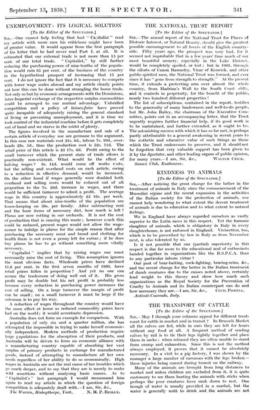UNEMPLOYMENT : ITS LOGICAL SOLUTION
[To the Editor of the SPECTATOR.] SIR,—One cannot help feeling that had " Capitalist " read my article with more care his criticisms might have been of greater value. It would appear from the first paragraph of his letter that he had never read Part I. at all. It is estimated that our external trade is not more than 15 per cent. of our total trade. " Capitalist," by still further reducing the purchasing power of nine-tenths of the popula- tion would ruin 85 per cent. of the' business of the country in the hypothetical prospect of increasing that 15 per cent. I do not ignore the fact that it is necessary to compete with lower wage scales abroad and my article clearly points out how this can be done without strangling the home trade. Not only so but by economic arrangements with the Dominions, inter-Imperial exchange of the respective surplus commodities could be arranged to our mutual advantage. Unbridled competition and a policy of laissez-faire have proved quite incapable of adequately raising the general standard of living or preventing unemployment, and it is time we took control of the industrial machine before it gets completely out of hand and we starve in the midst of plenty.
The figures involved in the manufacture and sale of a certain article of everyday use are germane to the argument. In this case raw materials cost 21s. 8d., labour 7s. 10d., over- heads 235. 5d., thus the production cost is 52s. 11d. The retail price of this article is £3 17s. 6d. Profit owing to the small turnover which the present state of trade allows is practically non-existent. What would be the effect of halving- wages ? 3s. 11d, would come off works casts, but the selling and overhead costs on each article, owing to a reduction in effective demand, would be increased. On the other hand if wages generally were doubled both overhead and selling costs would be reduced out of all proportion to the 7s. 10d. increase in wages, and there would be sufficient turnover to admit a profit. The average wage in this country is approximately £2 105. per week. That means that about nine-tenths of the population are house-keeping on 50s. per family. After subtracting rent and the bare items of necessary diet, • how much is left ? Plums are now rotting in our orchards. It is not the cost of production that is causing this waste ; however much this could be reduced, present wages would not allow the wage- earner to indulge in plums for the simple reason that after purchasing the necessary meat and bread and clothing for health there is not even a penny left for extras ; if he does buy plums he has to go without something more vitally necessary.
" Capitalist " implies that by raising wages one must necessarily raise the cost of living. This assumption ignores the most obvious facts. Wholesale prices have declined 11.6 per cent. in the first seven months of 1980, have retail prices fallen in proportion ? And yet no one can accuse the tradesman of doing well out of it. His gross profit may be double but his net profit is probably less because every reduction in purchasing power. .increases the cost of selling. On a large turnover the margin of profit can be small ; on a small turnover it must be large if the salesman is to pay his way.
A reduction of wages throughout the country would have the same effect at home as reduced commodity prices have bud on the world ; it would accentuate depression.
Australia does not form an example for comparison. With a population of only six and a quarter million, she has attempted the impossible in trying to make herself economic- ally independent. Modern methods of production require large populations for the absorption of their products, and Australia will be driven to form an economic alliance with a manufacturing country capable of absorbing her vast surplus of primary products in exchange for manufactured goods, instead of attempting to manufacture all her own needs regardless of her ability to do so economically. High wages in Australia are not the real cause of her troubles which go much deeper, and to say that they arc is merely to make wild assertions without analysing basic causes. As to Capitalist's " last paragraph I would recommend him again to read my article in which the question of foreign competition is adequately dealt with.—I am, Sir, &c.,
The Warren, Eishopthorpe, York. N. M. F. kiy..t4LX.










































 Previous page
Previous page